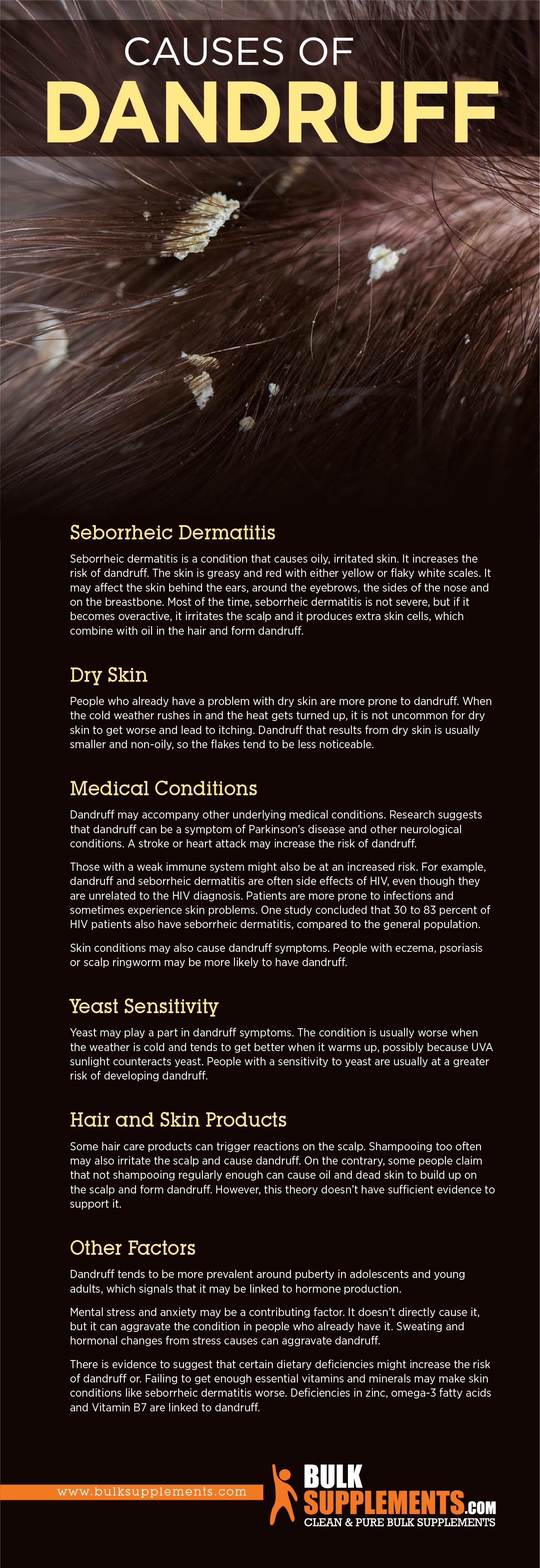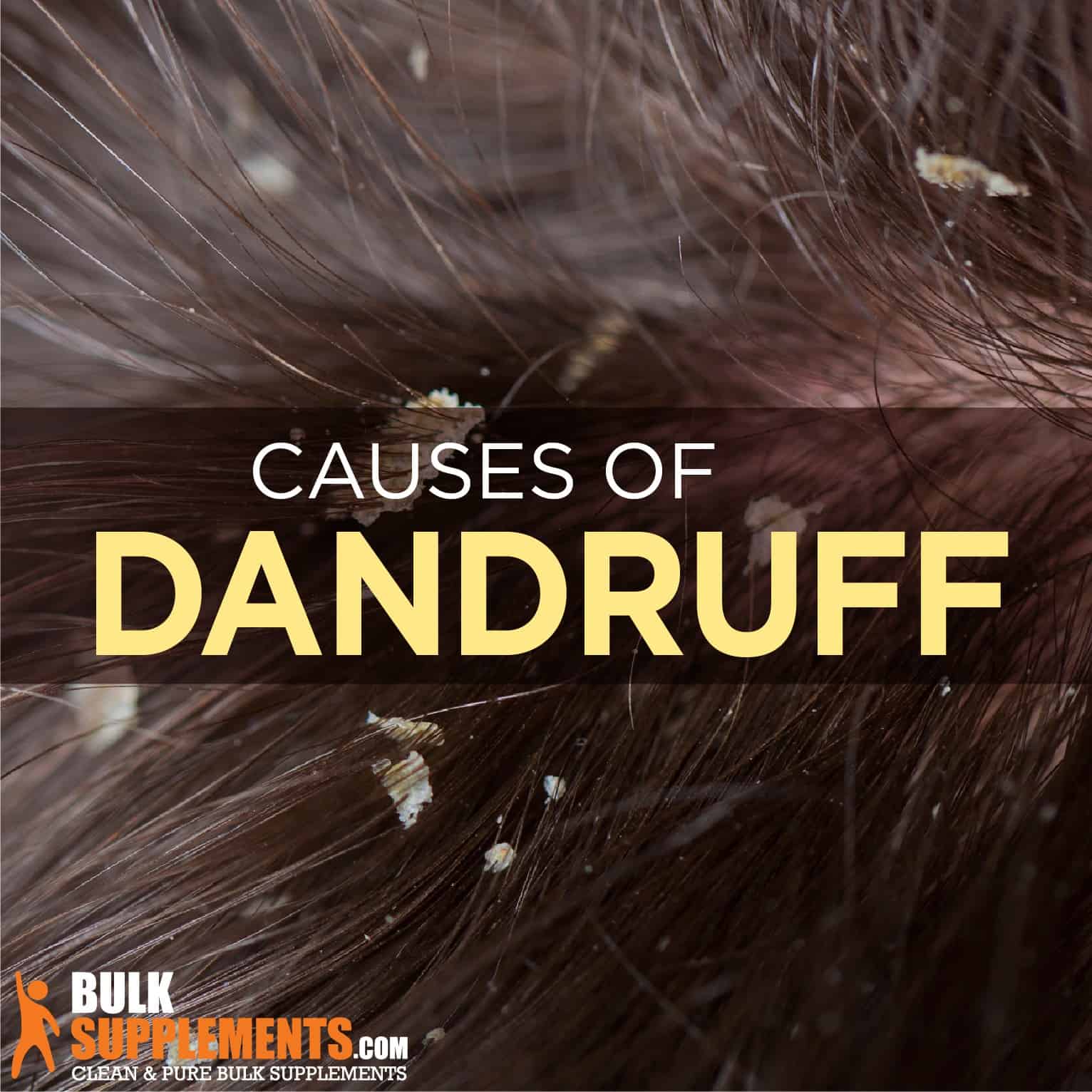What is Dandruff?
For most people, a dry scalp is nothing more than a mere inconvenience. But if you have dandruff, that inconvenience can be more embarrassing than acceptable. Dandruff is a condition that causes dryness, itching and flaking on the scalp and the hair.
You might assume that dandruff results from poor hygiene, but that is not the case. However, if you are prone to it, then failing to wash your hair frequently might make dandruff more noticeable. It is not usually in a serious condition. In most instances, brushing more effectively and switching hair products is enough to curb the symptoms. On the other hand, if it is severe enough, medical attention might be necessary, and occasionally it may come with complications. (x)
What Causes Dandruff?
Dandruff causes extreme dryness that can lead to white skin flakes in the hair. Contrary to common belief, dandruff has nothing to do with poor hygiene habits. The causes are unclear, but there are several theories about why you experience it, and others don’t. (x) Some known causes:
- Seborrheic Dermatitis
Seborrheic dermatitis is a condition that causes oily, irritated skin. It increases the risk of dandruff. The skin is greasy and red with either yellow or flaky white scales. It may affect your skin behind the ears, around the eyebrows, the sides of the nose and on the breastbone. Seborrheic dermatitis is not severe most of the time, but if it becomes overactive, it irritates the scalp and produces extra skin cells, which combine with oil in your hair and form dandruff. (x)
- Dry Skin
If you already have a problem with dry skin, they you are more prone to dandruff. When the cold weather rushes in and the heat gets turned up, it is not uncommon for dry skin to worsen and lead to itching. Dandruff that results from dry skin is usually smaller and non-oily, so the flakes tend to be less noticeable. (x)
- Medical Conditions
Dandruff may accompany other underlying medical conditions. (x) Research suggests that dandruff can be a symptom of Parkinson’s disease and other neurological conditions. (x) A stroke or heart attack may increase the risk of dandruff.
Those with a weak immune system might also be at risk more than other people who don’t. For example, dandruff and seborrheic dermatitis are often side effects of HIV, even though they are unrelated to the HIV diagnosis. Patients are more prone to infections and sometimes experience skin problems. (x) One study concluded that 30 to 83 percent of HIV patients also have seborrheic dermatitis than the general population. (x)
Skin conditions may also cause dandruff symptoms. (x) People with eczema, psoriasis or scalp ringworm may be more likely to have dandruff.
- Yeast Sensitivity
A yeast called Malassezia may play a part in dandruff symptoms. (x) The condition is usually worse when the weather is cold and tends to get better when it warms up, possibly because UVA sunlight counteracts yeast. People with a sensitivity to yeast are usually at a greater risk of developing dandruff. (x)
- Hair and Skin Products
Some hair care products can trigger reactions on the scalp. Shampooing too often may also irritate the scalp and cause dandruff. On the contrary, some people claim that not shampooing regularly enough can cause oil and dead skin to build up even more on the scalp and form dandruff. However, this theory doesn’t have sufficient evidence to support it. (x)
- Other Factors
Dandruff tends to be more prevalent around puberty in adolescents and young adults, which signals that it stems from hormone production. (x) (x)
Mental stress and anxiety may be contributing factors. It doesn’t directly cause it, but it can aggravate the condition in people who already have it. Sweating and hormonal changes from stress causes can exacerbate dandruff. (x)
There is evidence to suggest that certain dietary deficiencies might increase the risk of dandruff. Failing to get enough essential vitamins and minerals may make skin conditions like seborrheic dermatitis worse. Deficiencies in zinc, omega-3 fatty acids and vitamin B7 can cause dandruff. (x)
Treating Dandruff
Treating dandruff means slowing down skin cell growth. If yeast is causing the problem, it means counteracting it. Making lifestyle changes can help to reduce dandruff, such as managing stress, shampooing more or less often and increasing sun exposure. Brushing the hair more frequently may also facilitate and loosen the flakes. (x)

Shampoos and Scalp Preparations
Over-the-counter products might help control seborrheic dermatitis, which can lead to dandruff, but they cannot completely cure it. Try to remove any crusty patches from the scalp before using the shampoo to make it more effective. Antifungal dandruff shampoos have specific ingredients to regulate oil in the skin. (x) Those ingredients include:
- Ketoconazole
Ketoconazole is an antifungal and treats certain kinds of dandruff. Read the label carefully.
- Selenium Sulfide
Selenium sulfide reduces oils in the scalp and is an ingredient in most dandruff shampoos.
- Zinc Pyrithione
Zinc pyrithione helps to slow down yeast production.
- Coal Tar
It’s a natural antifungal, but it might stain dyed or color-treated hair after long-term use. It may also make the scalp more sensitive to direct sunlight. There is also evidence that in high doses, it might be carcinogenic. (x)
- Salicylic Acid
It might reduce skin cells, but it may also cause the scalp to dry out and make your dandruff worse.
- Tea-tree Oil
Tea-tree oil is an antifungal agent that also works as an antiseptic and antibiotic. (x)
Shampooing Tips for Dandruff
After you find a shampoo that works, it is best to use it every day until you notice a significant difference. Alternating between different ingredients might help target and reduce the symptoms. To gain the most from the shampoo, always let it sit on the scalp for a minimum of five minutes. The ingredients won’t have enough time to work if you rinse too soon. If dandruff results from dry skin, use moisturizing shampoos. (x)
Supplements for Skin Health and Dandruff
Sometimes dandruff may result from nutrient deficiencies. Adding supplements to your diet can ensure that the body gets all the vitamins it needs. They may also promote healthy, moisturized skin to help treat or prevent dandruff. (x) Consult a doctor before using any supplements. Some supplements to consider:
- Collagen
Collagen is a natural protein in the skin, muscles and internal organs. It allows the body to move while also supporting connective tissues and muscles inside of it. It is also responsible for skin elasticity. Collagen levels decrease over time, and many people use supplements derived from other mammals to promote healthy, younger-looking skin. (x) Take 2,500 mg of hydrolyzed bovine collagen powder two to four times a day unless a physician recommends otherwise.
- Biotin
Also known as vitamin B7, biotin helps break down fatty acids, amino acids and glucose. It is also a common ingredient in cosmetics because it can strengthen fingernails, keep hair healthy and clarify skin infections and conditions, such as acne. A study concluded that biotin deficiency might cause seborrheic dermatitis. (x) Take 100 mg of vitamin B7 daily as a dietary supplement.
- Omega-3 Fatty Acids
Fatty acids, including omega-3, are natural lubricants. They improve hydration, regulate oil production in the skin, and deficiency in fatty acids may cause a dry, itchy scalp. They are present in food, including salmon and walnuts, but supplements can also help boost omega-3. (x) (x) As a dietary supplement, take three Omega 3-6-9 softgels one to two times a day unless a physician advises otherwise.
- Zinc
Zinc is an antioxidant that promotes immune function and cell growth. It is present in proteins, nuts and whole grains. Deficiencies may cause hair loss, diarrhea and skin lesions. It may also treat dandruff because it can remove skin cells from the scalp and stop fungus from growing. (x) Unless a physician advises against it, take zinc as a dietary supplement in 225 to 450 mg doses once every day.
Where to Buy Supplements for Dandruff?
You can purchase these supplements for helping with your dandruff at BulkSupplements.com. The company is an industry-leading manufacturer and distributor of pure dietary supplements.
BulkSupplements.com is not just a consumer brand. It also supplies pure ingredients to other food and supplement brands to make their products. All products at BulkSupplements.com are manufactured and tested according to current and proper manufacturing practices.
Are you interested in trying any of these supplements mentioned in this article as a possible solution to helping you with dandruff? Contact BulkSupplements.com to place an order today.
The Bottom Line
Dandruff is a condition that causes extreme dryness in the scalp and leaves white flakes in the hair. Although it can be inconvenient, typically, dandruff is not a serious or harmful condition. There is no obvious cause of dandruff, but certain factors increase the risk of developing it. For example, seborrheic dermatitis, a weakened immune system, yeast sensitivity and stress may trigger dandruff symptoms.
Making lifestyle changes may reduce the symptoms, and some shampoos can help control them. But, finding the proper treatment may be a trial-and-error process, and it may mean trying different products and strategies to find one that works. These products or strategies will not cure the condition altogether, but they can help manage it.
Supplements may also help promote healthy skin and help with nutrient deficiencies. Consult a doctor before adding supplements to your diet.
These statements have not been evaluated by the Food and Drug Administration. These products are not intended to diagnose, treat, cure or prevent any disease.


